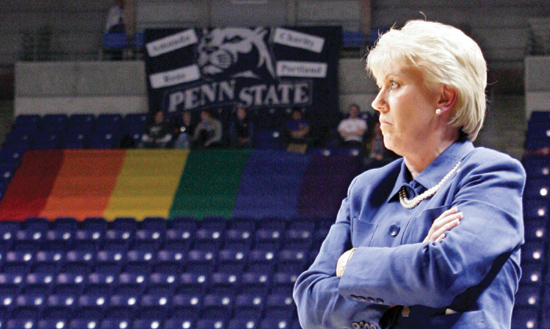Training Rules is a new documentary by Oscar nominee Dee Mosbacher that examines the effect Penn State basketball coach Rene Portland’s alleged “no lesbian” policy had on students.
Mosbacher focuses on a lawsuit filed in 2005 by former Penn State basketball player Jennifer Harris. Harris claims Portland repeatedly criticized her for not being feminine enough in her attire, plagued her with questions and insinuations about her sexuality, threatened to kick her off the team if she was gay, and told players not to associate with her and other team members whom she perceived to be lesbian. Harris’ basketball scholarship was pulled in 2005, even though she was one of the team’s top players and had a 3.0 GPA.
Karen Doering, Harris’ attorney, has also accused Portland of discouraging potential students to attend the school on basketball scholarships if they are lesbians. Doering said that for decades Portland has harassed players she believes are lesbians, told other players not to associate with them and described other programs as pro-gay to recruits. She cites a 1986 article in the Chicago-Sun Times, which reports on the increasing presence of lesbians in women’s college sports. Portland is quoted in the article saying, “I will not have it in my program. I bring it up and the kids are so relieved and the parents are so relieved. But they would probably go without asking the question otherwise, which is really dumb.”
Portland was first pulled into the spotlight for bias in March 1991, after a profile was written about her in the Philadelphia Inquirer. In the article students interviewed claimed that Portland’s sentiments concerning homosexuality and her policing of lesbians–or those whom she considered to be lesbians–were common knowledge. Portland’s team policy was referenced as “no drinking, no drugs, and no lesbians.”
The article spurred protests by students and local gay rights groups, asking the university to change their anti-discrimination policy to include sexual orientation. In May the Faculty Senate approved a policy specifically protecting homosexuals. However, in December students and the Graduate Coalition for Gay, Lesbian and Bisexual Rights were still protesting, claiming that Portland’s stance on homosexuality had not changed. Portland told the Associated Press in 2005 that she supports the university’s anti-discrimination policy, and that she is proud to be part of an athletic program “that takes such a strong stand…in promoting the virtues of a diverse institution and community.”
While her policies were often called into question, Portland had a 578-204 record during her 25 years on the job, and helped bring the team to several championships and to the Final Four of the NCAA. Throughout the 1991 protests and the 2005 lawsuit, Penn State was noncommittal regarding the claims of Portland’s bias, but university lawyers would not represent Portland. Portland resigned two months after the suit was settled in 2007.


What Do You Think?